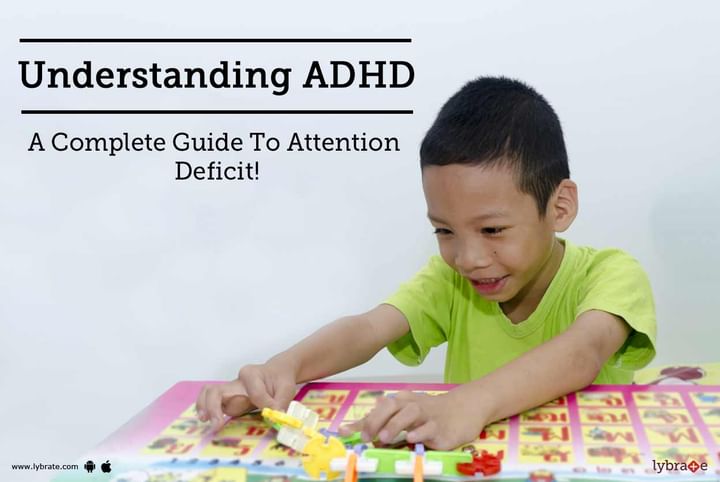Understanding ADHD - A Complete Guide To Attention Deficit!
Attention deficit/hyperactivity disorder (ADHD) is among the most common neurobehavioral disorders presenting for treatment in children and adolescents. ADHD is often chronic with prominent symptoms and impairment spanning into adulthood. ADHD is often associated with co-occurring disorders including disruptive, mood, anxiety, and substance abuse. The diagnosis of ADHD is clinically established by review of symptoms and impairment. The biological underpinning of the disorder is supported by genetic, neuroimaging, neurochemistry and neuropsychological data. Consideration of all aspects of an individual’s life needs to be considered in the diagnosis and treatment of ADHD.
Specialized educational planning based on the child’s difficulties is necessary in a majority of cases. Since learning disorders co-occur in one-third of ADHD youth, ADHD individuals should be screened and appropriate individualised educational plans developed. Educational adjustments should be considered in individuals with ADHD with difficulties in behavioral or academic performance.
Symptoms in children and teenagers
The symptoms of ADHD in children and teenagers are well defined, and they're usually noticeable before the age of six. They occur in more than one situation, such as at home and at school. The main signs of each behavioural problem are detailed below:
- Inattentiveness: having a short attention span and being easily distracted making careless mistakes – for example, in schoolwork appearing forgetful or losing things being unable to stick at tasks that are tedious or time-consuming appearing to be unable to listen to or carry out instructions constantly changing activity or task having difficulty organising tasks
- Hyperactivity and impulsiveness: being unable to sit still, especially in calm or quiet surroundings constantly fidgeting being unable to concentrate on tasks excessive physical movement excessive talking being unable to wait their turn acting without thinking interrupting conversations little or no sense of danger
These symptoms can cause significant problems in a child's life, such as underachievement at school, poor social interaction with other children and adults, and problems with discipline.
Related conditions in children and teenagers
Although not always the case, some children may also have signs of other problems or conditions alongside ADHD, such as:
- anxiety disorder – which causes your child to worry and be nervous much of the time; it may also cause physical symptoms, such as a rapid heartbeat, sweating and dizziness
- oppositional defiant disorder (ODD) – this is defined by negative and disruptive behaviour, particularly towards authority figures, such as parents and teachers
- conduct disorder – this often involves a tendency towards highly antisocial behaviour, such as stealing, fighting, vandalism and harming people or animals
- depression
- sleep problems – finding it difficult to get to sleep at night, and having irregular sleeping patterns
- autistic spectrum disorder (ASD) – this affects social interaction, communication, interests and behaviour
- epilepsy – a condition that affects the brain and causes repeated fits or seizures
- Tourette’s syndrome – a condition of the nervous system, characterised by a combination of involuntary noises and movements called tics
- learning difficulties – such as dyslexia Symptoms in adults In adults, the symptoms of ADHD are more difficult to define. This is largely due to a lack of research into adults with ADHD.
It's known that symptoms of ADHD often persist from childhood into a person's teenage years, and then adulthood. Any additional problems or conditions experienced by children with ADHD, such as depression or dyslexia, may also continue into adulthood. By the age of 25, an estimated 15% of people diagnosed with ADHD as children still have a full range of symptoms, and 65% still have some symptoms that affect their daily lives. The symptoms in children and teenagers, which are listed above, is sometimes also applied to adults with possible ADHD. But some specialists say that the way in which inattentiveness, hyperactivity and impulsiveness affect adults can be very different from the way they affect children. For example, hyperactivity tends to decrease in adults, while inattentiveness tends to get worse as the pressure of adult life increases. Adult symptoms of ADHD also tend to be far more subtle than childhood symptoms.
Some specialists have suggested the following list of symptoms associated with ADHD in adults:
- carelessness and lack of attention to detail
- continually starting new tasks before finishing old ones
- poor organisational skills
- inability to focus or prioritise
- continually losing or misplacing things
- forgetfulness
- restlessness and edginess
- difficulty keeping quiet and speaking out of turn
- blurting out responses and often interrupting others
- mood swings, irritability and a quick temper
- inability to deal with stress
- extreme impatience
- taking risks in activities, often with little or no regard for personal safety or the safety of others – for example, driving dangerously
Additional problems in adults with ADHD As with ADHD in children and teenagers, ADHD in adults can occur alongside several related problems or conditions. One of the most common conditions is depression. Other conditions that adults may have alongside ADHD include:
- personality disorders – conditions in which an individual differs significantly from an average person, in terms of how they think, perceive, feel or relate to others
- bipolar disorder – a condition that affects your moods, which can swing from one extreme to another
- obsessive-compulsive disorder (OCD) – a condition that causes obsessive thoughts and compulsive behaviour
The behavioural problems associated with ADHD can also cause problems such as difficulties with relationships, social interaction, drugs and crime. Some adults with ADHD find it hard to find and stay in a job. If you notice any of the above in your child or yourself , it is worth making the effort and spending some time and money to have your child and or yourself assessed on a priority basis as ADHD causes neural changes in the brain.



+1.svg)
